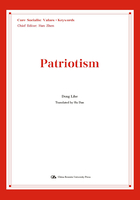
★Additional Information
Contention of a Hundred of Schools of Thought refers to the Spring and Autumn Period(770 B. C. —476 B. C. )and the Warring States Period(475 B. C. —221 B. C. )when different schools of thought contended with each other freely and openly. According to The History of Han-Art and Literature, there were 189 schools with definite names. They were called“a hundred schools”, of which ten were most famous. They were the Confucius, Mohist, Taoist, Legalists, the Yin-Yang School, the Eclectics, the Logicians, Political Strategists, Military Strategists and the Fictionists.
Liu Xin of the Western Han Dynasty deleted the Fictionists from the list in his Seven Strategists, and he called them“the Nine Streams”. Thus, the“Ten Schools and Nine Streams”came into being. The flourishing culture in the Spring and Autumn Period and the Warring States Period had distinct national features and was just as magnificent as the ancient Greek civilization at almost the same time. The culture and thoughts at that period had profound influence on the ideologies and behaviors of the Chinese of later generations.
The time before the Qin and Han dynasties, especially during the Xia, Shang and Zhou dynasties, and the Spring, Autumn and Warring States Period was important for the formation of the Chinese nationality when different tribes in the Central Plain of China were being integrated and united. At that time, a unified country with multiple ethnic groups had not being formed. The heads of the Xia,Shang and Zhou dynasties were emperors in name. Various kingdoms were relatively independent political entities. A unified Chinese nationality was still in the process of formulation. Thus, during that period, Chinese patriotism was still in conception, signified by affection for relatives, their land, ethnic group and motherland. The theme of patriotism then was to establish a living space with favorable economic conditions and a culture of its own, and to formulate a unified nationality with multiple ethnic groups. Broadly speaking, at that time, loving one's own homeland and people, and doing anything conducive to the unification of different ethnic groups and to the wellbeing and progress of the society were Chinese patriotism.